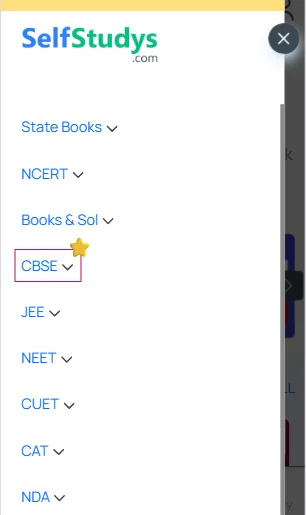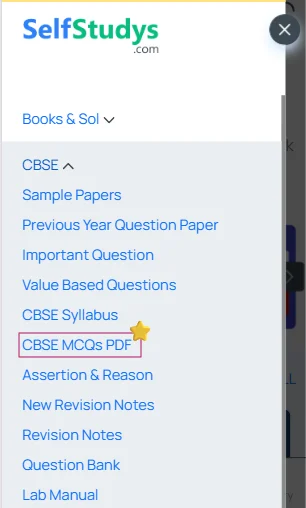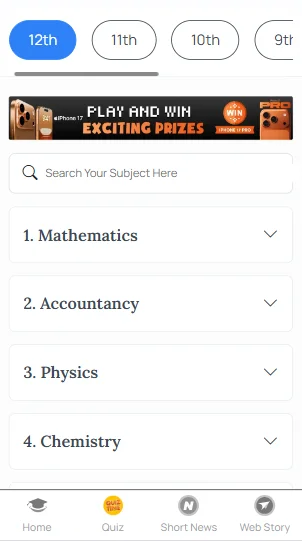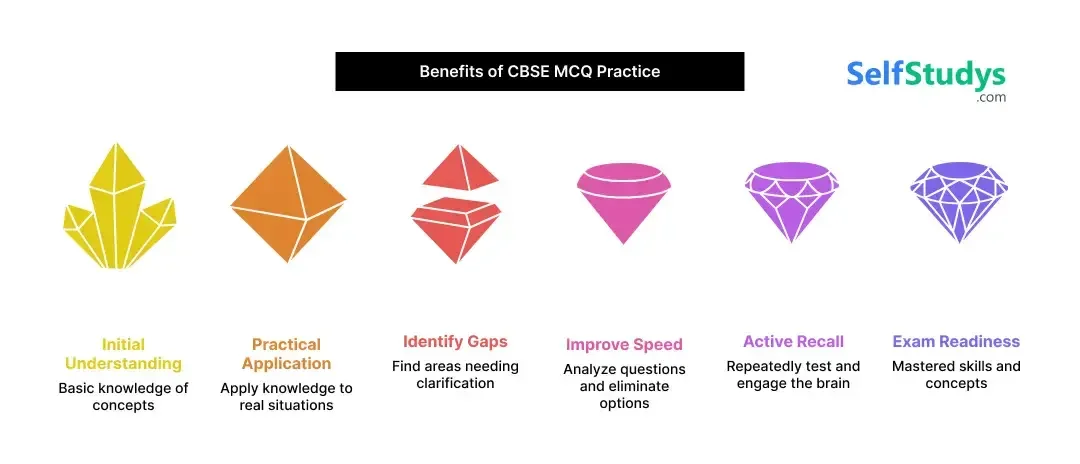-
1. Mathematics
- 1. Relations and Functions
- 2. Inverse Trigonometric Functions
- 3. Matrices
- 4. Determinants
- 5. Continuity and Differentiability
- 6. Application of Derivatives
- 7. Integrals
- 8. Application of Integrals
- 9. Differential Equations
- 10. Vector Algebra
- 11. Three Dimensional Geometry
- 12. Linear Programming
- 13. Probability
-
2. Accountancy
- 1. Accounting for Not for Profit Organisation
- 2. Accounting for Partnership Basic Concepts
- 3. Reconstitution of Partnership Firm Admission of a Partner
- 4. Reconstitution of Partnership Firm Retirement Death of a Partner
- 5. Dissolution of a Partnership Firm
- 6. Accounting for Share Capital
- 7. Issueand Redemption of Debentures
- 8. Financial Statements of a Company
- 9. Analysisof Financial Statements
- 10. Accounting Ratios
- 11. Cash Flow Statement
-
3. Physics
- 1. Electric Charges and Fields
- 2. Electrostatic Potential and Capacitance
- 3. Current Electricity
- 4. Moving Charges and Magnetism
- 5. Magnetism and Matter
- 6. Electromagnetic Induction
- 7. Alternating Current
- 8. Electromagnetic Waves
- 9. Ray Optics and Optical Instruments
- 10. Wave Optics
- 11. Dual Nature of Radiation and Matter
- 12. Atoms
- 13. Nuclei
- 14. Semiconductor Electronics Materials, Devices and Simple Circuits
-
4. Chemistry
- 1. Solutions
- 2. Electrochemistry
- 3. Chemical Kinetics
- 4. Surface Chemistry
- 5. General Principles and Processes of Isolation of Elements
- 6. The p-Block Elements
- 7. The d-and f-Block Elements
- 8. Coordination Compounds
- 9. Haloalkanes and Haloarenes
- 10. Alcohols, Phenols and Ethers
- 11. Aldehydes, Ketones and Carboxylic Acids
- 12. Amines
- 13. Biomolecules
- 14. Polymers
- 15. Chemistry in Everyday Life
- 16. Solid State
-
5. Biology
- 1. Reproduction in Organisms
- 2. Sexual Reproduction in Flowering Plants
- 3. Human Reproduction
- 4. Reproductive Health
- 5. Principles of Inheritance and Variation
- 6. Molecular Basis of Inheritance
- 7. Evolution
- 8. Human Health and Disease
- 9. Strategies for Enhancement in Food Production
- 10. Microbes in Human Welfare
- 11. Biotechnology Principles and Processes
- 12. Biotechnology and its Applications
- 13. Organisms and Populations
- 14. Ecosystem
- 15. Biodiversity and Conservation
- 16. Environmental Issues
- 6. Business Studies
-
7. History
- 1. Bricks, Beads and Bones
- 2. Kings, Farmers and Towns
- 3. Kinship, Caste and Class
- 4. Thinkers, Beliefs and Buildings
- 5. Through the Eyes of Travellers
- 6. Bhakti-Sufi Traditions
- 7. An Imperial Capital Vijayanagara
- 8. Peasants, Zamindars and the State
- 9. Kings and Chronicles
- 10. Colonialism and the Countryside
- 11. Rebels and the Raj
- 12. Colonial Cities
- 13. Mahatma Gandhi and the Nationalist Movement
- 14. Understanding Partition
- 15. Framing the Constitution
-
8. Indian Economic Development
- 1. Indian Economy on the Eve of Independence
- 2. Indian Economy 1950-1990
- 3. Liberalisation, Privatisation and Globalisation An Appraisal
- 4. Poverty
- 5. Human Capital Formation in India
- 6. Rural Development
- 7. Employment Growth, Informalisation and Other Issues
- 8. Infrastructure
- 9. Environment and Sustainable Development
- 10. Comparative Development Experiences of India and its Neighbours
- 9. Introductory Macroeconomics
- 10. Fundamentals of Human Geography
-
11. India People and Economy
- 1. Population Distribution, Density, Growth and Composition
- 2. Migration Types, Causes and Consequences
- 3. Human Development
- 4. Human Settlements
- 5. Land Resources and Agriculture
- 6. Water Resources
- 7. Mineral and Energy Resources
- 8. Manufacturing Industries
- 9. Planning and Sustainable Development in Indian Context
- 10. Transport and Communication
- 11. International Trade
- 12. Geographical Perspective on Selected Issues and Problems
- 12. Contemporary World
-
13. Politics in India Since Independence
- 1. Challenges of Nation Building
- 2. Era of One Party Dominance
- 3. Politics of Planned Development
- 4. India’s External Relations
- 5. Challenges to and Restoration of Congress System
- 6. The Crisis of Democratic Order
- 7. Rise of Popular Movements
- 8. Regional Aspirations
- 9. Recent Developments in Indian Politics
- 14. Flamingo (Prose)
- 15. Flamingo (Poems)
- 16. Vistas
One effective way you can make sure to progress and succeed in the exams is by practicing the CBSE MCQs from the SelfStudys platform thoroughly. This format of questions is not only integral to the exams but also serves as a powerful tool for reinforcing key concepts and improving your overall understanding of subjects.
The main principle of the CBSE MCQs PDF is to check your grasp of various topics. This tests your knowledge as well as the ability to apply concepts. By solving these multiple-choice questions, you can get a dual advantage of mastering the content and building your confidence.
Understanding The Structure Of The CBSE MCQs PDF
Below is a table that gives you a clear overview of how the CBSE MCQ question bank PDF is structured and what you can expect in the exam.
|
ASPECT |
EXPLANATION |
|
Question Stem |
This is the main part of the question that asks you to solve something. You have to give an answer to the problem or concept. |
|
Options/Choices |
There are 4 to 5 possible answers that are given in the CBSE MCQ questions PDF free download. You need to know that only one answer is correct. The others are there just to test your level of knowledge. |
|
Correct Answer |
This is the only right answer among all the given options. It means only this solves the question correctly. |
|
Distractors |
These are the wrong answers that are meant to confuse you while solving the CBSE MCQ questions. They also help to test if you actually understand the topic. |
|
Level of Difficulty |
The CBSE MCQ question paper can range from easy and hard. You will find that while some questions are quite simple, others need more thought as well as understanding. |
|
Negative Marking |
In the CBSE exams, there is no negative marking. So, you should not worry about losing points for guessing in the CBSE MCQ questions with answers. |
|
Time Management |
Answering the CBSE MCQs should be done quickly. You need to make sure that you practice managing your time so you can finish all the questions during the exam. |
|
Types of Questions |
The multiple-choice questions can be based on facts (what you know), concepts (how things work), real-life situations (how to use what you have learned), etc. |
|
Visual or Data-Driven MCQs |
Some questions in the CBSE MCQs PDF might show a picture, graph, or table. In this, you have to read and understand it before selecting an answer. |
Solutions Provided In The CBSE MCQ Question Bank PDF
On our platform, the team of experts creates the CBSE MCQ question bank PDF. In this, after selecting all the questions, they not only provide the solution but also explain the reasoning behind it. With the help of these detailed solutions, you can easily verify your responses as well as learn about your mistakes. Then, you can make changes in your study plan to improve those particular mistakes. This process will reinforce your knowledge, enhance your problem-solving skills, develop your time management ability, and so on.
CBSE MCQ Questions PDF Free Download For Different Classes
We prepare the CBSE MCQ questions PDF free download from classes 12th to 6th. This means that students of any class can utilize this resource and enhance their skills to solve such multiple-choice questions for their exam, as well as unit tests. You can even click on the links that are mentioned below to access these class-wise PDFs directly.
| CBSE MCQ Class Wise | |
|---|---|
| CBSE Class 12 MCQs | CBSE Class 11 MCQs |
| CBSE Class 10 MCQs | CBSE Class 9 MCQs |
| CBSE Class 8 MCQs | CBSE Class 7 MCQs |
| CBSE Class 6 MCQs | |
How To Solve The CBSE MCQ Questions On Our Website For Free?
By following the steps that are given below, you will be able to get to the page where the CBSE MCQ questions are provided and solve them easily.
- You have to search for SelfStudys on any of the browsers that you use most. You are at the right place if the image below displays on your screen.

- First, you need to click on the ‘Navigation’ tab in the left corner of the screen.
- You can check out various categories and then select the ‘CBSE’ section.

- With this selection, you will see a drop-down menu wherein you have to choose the ‘CBSE MCQs PDF’ option.

- Now, the main page for the CBSE MCQ question paper will open up. Here, you can simply select your class.

- After this, all the subjects of your class for which we provide CBSE MCQ questions with answers will appear, and you need to click on the specific name.

- Finally, the chapter-wise list for those subjects’ CBSE MCQs will be available. You are allowed to select any chapter and start with your practice of the questions.
Note: Don’t forget to Log In or Sign Up on the platform to download any CBSE MCQ question bank PDF.
The Benefits Of Practicing CBSE MCQ Question Paper For Exam Success
When you practice with the CBSE MCQ questions PDF free download, you not only improve your exam score but also master the key skills and concepts. Here are some detailed benefits of this resource.

- In the CBSE MCQ questions, you have to apply your theoretical knowledge to practical situations. By doing so, you are able to understand the underlying concepts more clearly. These questions force you to recall facts, explain processes, or calculate solutions. All of this enhances your comprehension skills.
- Many students have unclear ideas about some concepts. By answering the CBSE MCQ question paper, you can find which topics you have mastered as well as which ones require further clarification. This feedback on your mistakes helps you address these gaps before the real examination.
- Every MCQ has a set of possible answers, which helps you learn to analyze the question quickly and eliminate the wrong options. It makes the entire process faster. By practicing the CBSE MCQ questions with answers on a regular basis, you will be able to improve your decision-making speed. This is quite important when answering MCQs within a time limit.
- It is a known fact that one great memory-boosting technique is active recall, and CBSE MCQs encourage this. When you answer these questions repeatedly and test yourself, you are engaging your brain in a way that improves long-term retention of information.
- The CBSE MCQs PDF is a tool with which you can check your level of preparation without any external help. This way, you get a sense of control over your learning process and improve continuously.
Most Important Subjects And Topics For CBSE MCQs Preparation (Class 6 to 12)
In the table below, we have mentioned all the subjects and topics that you need to study before solving the CBSE MCQ question bank PDF.
|
CLASS |
SUBJECT |
IMPORTANT TOPICS FOR MCQs |
|
12 |
Mathematics |
Relations & Functions, Matrices & Determinants, Continuity & Differentiability, Integrals, Differential Equations, Vectors, Probability |
|
Physics |
Electrostatics, Current Electricity, Magnetic Effects of Current, Ray & Wave Optics, Atoms & Nuclei, Semiconductor Electronics, Dual Nature of Matter |
|
|
Chemistry |
Electrochemistry, Chemical Kinetics, Coordination Compounds, Aldehydes-Ketones, Alcohols & Phenols, Solutions, Surface Chemistry |
|
|
Biology |
Sexual & Asexual Reproduction, Genetics & Evolution, Human Health & Diseases, Biotechnology, Microbes in Human Welfare, Ecology & Environment |
|
|
English Core |
Unseen Passages, Invitations, Report Writing, Job Application, Value-Based Questions, Poem & Prose Interpretation (Flamingo & Vistas) |
|
|
11 |
Mathematics |
Sets, Relations & Functions, Trigonometry, Complex Numbers, Sequences & Series, Limits & Derivatives, Straight Lines, Probability |
|
Physics |
Units & Measurements, Kinematics, Laws of Motion, Work, Energy, Power, Gravitation, Mechanical Properties of Fluids, Oscillations & Waves |
|
|
Chemistry |
Some Basic Concepts, Structure of Atom, Chemical Bonding, States of Matter, Thermodynamics, Equilibrium, Redox Reactions |
|
|
Biology |
Cell Structure, Plant Physiology (Transport & Photosynthesis), Digestion & Respiration in Humans, Biological Classification, Animal Tissues |
|
|
English Core |
Reading Comprehension, Note-Making, Grammar (Transformation, Modals), Speech Writing, Article Writing, Literature Analysis (Hornbill & Snapshots) |
|
|
10 |
Mathematics |
Real Numbers, Quadratic Equations, AP, Triangles, Circles, Surface Areas & Volumes, Statistics, Coordinate Geometry |
|
Science |
Chemical Reactions, Acids-Bases-Salts, Electricity, Magnetic Effects, Life Processes, Control & Coordination, Light, Heredity and Evolution |
|
|
Social Science |
Nationalism in India, Power Sharing, Sectors of the Economy, Globalisation, Agriculture, Manufacturing Industries, Political Parties |
|
|
English |
Discursive & Factual Passages, Analytical Paragraph, Letter & Report Writing, Poetic Devices, Prose Analysis, Inference-Based Questions |
|
|
9 |
Mathematics |
Polynomials, Linear Equations in Two Variables, Lines & Angles, Triangles, Circles, Surface Areas & Volumes, Probability, Coordinate Geometry |
|
Science |
Matter in Our Surroundings, Is Matter Around Us Pure?, Atoms & Molecules, Motion, Force & Laws of Motion, Tissues, Diversity of Living Organisms |
|
|
Social Science |
French Revolution, Russian Revolution, Climate, Drainage, Democracy & Constitution, Electoral Politics, Population, Working of Institutions |
|
|
English |
Subject-Verb Agreement, Editing & Omission, Comprehension Passages, Diary Entry, Short Story Writing, Literary Interpretation |
|
|
8 |
Mathematics |
Linear Equations, Squares & Square Roots, Cubes, Data Handling, Rational Numbers, Geometry of Quadrilaterals, Mensuration, Factorisation |
|
Science |
Force & Pressure, Friction, Sound, Combustion & Flame, Reproduction in Animals, Crop Production, Microorganisms, Cell Structure |
|
|
Social Science |
Colonial Rule, Indian Constitution, Public Facilities, Industries, Natural Vegetation & Wildlife, Mineral Resources, Revolt of 1857 |
|
|
English |
Active-Passive Voice, Direct-Indirect Speech, Diary Entry, Essay Writing, Reading Comprehension, Literary Devices |
|
|
7 |
Mathematics |
Algebraic Expressions, Simple Equations, Lines & Angles, Perimeter & Area, Comparing Quantities, Exponents & Powers, Congruence of Triangles |
|
Science |
Nutrition in Animals, Heat, Acids-Bases-Salts, Physical & Chemical Changes, Respiration in Organisms, Electric Current & Circuits, Forests, Water: A Resource |
|
|
Social Science |
Mughal Empire, Human Environment Interaction, Democracy, Role of the Government, Advertising & Media, Markets Around Us, Delhi Sultanate |
|
|
English |
Sentence Types, Reported Speech, Dialogue Writing, Descriptive Paragraphs, Word Order, Articles, Comprehension Skills |
|
|
6 |
Mathematics |
Fractions & Decimals, Integers, Geometry Basics, Data Handling, Mensuration, Ratio & Proportion, Algebra Introduction |
|
Science |
Changes Around Us, Electricity & Circuits, Motion & Measurement, Sorting Materials, Living & Non-living, Components of Food, Air Around Us |
|
|
Social Science |
The Earth in the Solar System, Maps & Globes, Diversity & Discrimination, Local Government, Rural & Urban Livelihoods, History of Ancient Civilizations |
|
|
English |
Parts of Speech, Tenses, Prepositions, Punctuation, Comprehension Passages, Paragraph Writing, Vocabulary Enrichment |
Why Is CBSE Focusing More On MCQs- What Students Should Know
In recent years, the shift by CBSE towards including more MCQs is not just a format change. This shows a deeper shift in how education, learning outcomes, as well as assessments are being reimagined. Below are some more detailed points on this matter.
- The earlier exam patterns often encouraged memorization. Students used to write long answers without proper conceptual understanding. But partial learning does not work with MCQs. You either know the concept fully or you don’t. With the help of CBSE MCQ questions PDF free download, you can check whether you grasp the logic, theory, or reasoning behind the topic.
- Competency-based education is promoted through the new National Education Policy (NEP 2020). This focuses more on critical thinking as well as practical application. The CBSE MCQ questions support this approach as they test your comprehension, application, and analysis skills.
- Since the CBSE MCQ question paper requires constant revision and practice, now, students are motivated to study daily. This way, instead of writing long answers sometimes, you develop the habit of testing yourself with quizzes, flashcards, mock tests, etc. It also creates a more active learning process.
- The MCQs are mostly for 1 mark, which means more questions can be asked from more chapters within the same duration. This way, you need to study all the chapters rather than focusing only on a few important ones. Practicing several CBSE MCQ questions with answers leads to a well-rounded knowledge.
- These multiple-choice questions are less challenging than the long-form answers. As you get used to the daily practice of the CBSE MCQs, you feel more control in your learning and less anxious during the final exams.
Conclusion
As the curriculum of CBSE keeps evolving, your way to prepare for the exams should as well. The CBSE MCQs PDF is considered to be a powerful tool that not only tests what you know but also how well you understand and apply it. From improving speed and accuracy to encouraging analytical thinking, this resource gives you a more practical as well as exam-ready approach to learning.







 Profile
Profile Signout
Signout









 Quiz
Quiz
 Get latest Exam Updates
Get latest Exam Updates 










